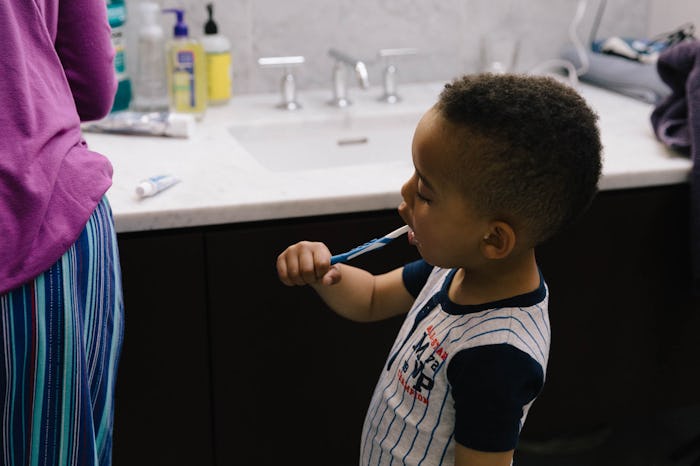Life
Here's The Deal With Toddlers & Cavities In Those Baby Teeth
Sometimes a long day with a toddler can mean a bedtime routine completely goes by the wayside because you are only operating on one mode: Must. Go. To. Bed. In our house, that sometimes means my husband dry brushing our daughter Claire's teeth while I change her diaper. And on the longest of days, it can mean saying to hell with it all, am I right? But does brushing those baby teeth have to be a priority? Like, can toddlers get cavities?
"Toddlers are at higher risk of developing cavities than at any other stage of development," Dr. Manuel A. Cordero, a New Jersey-based doctor of dental surgery and president at Academy of General Dentistry, tells Romper in an email interview. "Because of their rapid growth, they need frequent feeding and drinking in order to meet their nutritional needs as well as learning good oral hygiene habits."
Cordero points out, however, that even infants can get tooth decay. Basically, "if a child has a tooth, that tooth can get a cavity," he says.
But what about the notion that "baby teeth fall out anyway, so what's the big deal?" Not so, says Cordero, who adds that tooth decay can lead to problems down the line, like infection, which can in some cases cause damage to the adult tooth growing directly behind it if it's left untreated.
"Baby teeth are extremely important to a child's overall health and development," he says. "[They] play a critical role in speech development and self-esteem as the child becomes socially interactive. Baby teeth are not disposable — they are the training wheels of lifelong healthy habits that will make the difference between success and failure in our quest for a better and heathy life."
According to the American Dental Association, it's important to think of baby teeth as a place holder for permanent teeth. "When a baby tooth is lost too early, the permanent teeth can drift into the empty space and make it difficult for other adult teeth to find room when they come in," the website noted. "This can make teeth crooked or crowded."
Cordero says it's also important to keep in mind that baby teeth are not as strong as an adult tooth as a result of thinner enamel. That means when you spot a tiny cavity in a baby tooth, it's a much bigger cavity than it would be in a permanent tooth. "Parents should contact their child's dentist right away if they see signs of discoloration or a cavity," Cordero says.
Plus, February is National Children's Dental Health Month, so now is as good a time as ever to make sure your little one's oral health is in tip-top shape, right?
"The Academy of General Dentistry recommends scheduling two dental visits annually starting once the first tooth develops or at the child's first birthday," Cordero says. "The child's dentist can then help determine if the child is at low, moderate, or high risk for cavities and can help decide on the best oral hygiene practices to suit their needs."
Cordero says parents can also help prevent cavities by limiting food and drinks with high sugar, as well as eliminating tooth-decaying habits like allowing your child to go to bed with a bottle with anything but water. Thumb or pacifier sucking should also be limited, Cordero says.
Be sure you also keep an eye on teeth brushing by making it a family event and encourage toddlers to brush their teeth by establishing a regular twice-a-day routine. "The formula for success requires a close interaction between the dentist and the parents to start the infant with the nutritional and oral hygiene necessary to avoid a very prevalent, but preventable, disease process which is the dental cavity," Cordero says.
Our favorite teeth-brushing tools include a stool that is situated next to our bathroom counter, making it easy for Claire to see her pearly whites in the mirror. We also love the always-reliable Daniel Tiger teeth brushing song. Which, by the way, also means "Brusha, Brusha!" will make its way into your headspace at the most inopportune of times. Hello, 3 a.m.
Check out Romper's new video series, Bearing The Motherload, where disagreeing parents from different sides of an issue sit down with a mediator and talk about how to support (and not judge) each other’s parenting perspectives. New episodes air Mondays on Facebook.
